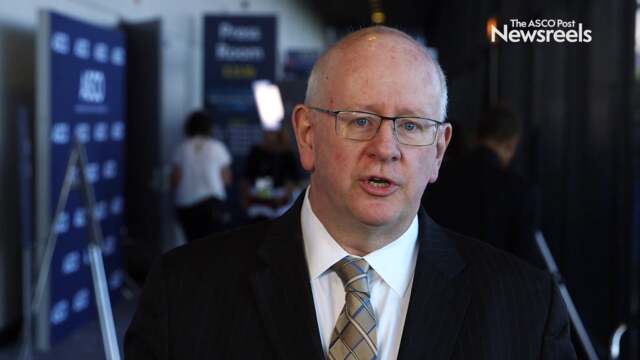Induction Chemotherapy Followed by Cetuximab and Radiotherapy vs Concurrent Chemoradiotherapy in Head and Neck Cancer
As reported in the Journal of Clinical Oncology by Geoffrois et al, the European phase III GORTEC (Groupe Oncologie Radiothèrapie Tête et Cou) 2007-02 trial has shown no improvement in progression-free survival with induction chemotherapy followed by cetuximab and radiotherapy (RT) vs...
FDA Approves Pembrolizumab in Combination With Chemotherapy for First-Line Treatment of Metastatic Nonsquamous NSCLC
Today, the U.S. Food and Drug Administration (FDA) approved pembrolizumab (Keytruda) in combination with pemetrexed (Alimta) and platinum as first-line treatment of patients with metastatic, nonsquamous non–small cell lung cancer with no EGFR or ALK genomic tumor aberrations. Pembrolizumab...
FDA Updates Prescribing Information for Pembrolizumab and Atezolizumab in Urothelial Carcinoma
On August 16, 2018, the U.S. Food and Drug Administration (FDA) updated the prescribing information for pembrolizumab (Keytruda) and atezolizumab (Tecentriq) to require the use of an FDA-approved companion diagnostic test to determine programmed cell death ligand 1 (PD-L1) levels in tumor tissue...
Cetuximab With Radiotherapy Found to Be Inferior to Standard Treatment in HPV-Positive Oropharyngeal Cancer
An interim analysis of data from a randomized clinical trial of patients with human papillomavirus (HPV)-positive oropharyngeal cancer found that treatment with radiation therapy and cetuximab (Erbitux) is associated with worse overall and progression-free survival compared to the current standard...
Bevacizumab and Temozolomide in First Recurrence of Glioma Without 1p/19q Codeletion
In a phase II trial funded by the European Organisation for Research and Treatment of Cancer and reported in The Lancet Oncology, van den Bent et al found no evidence of a survival benefit with the addition of bevacizumab (Avastin) to temozolomide in patients with a first recurrence of World Health ...
FDA Approves Nivolumab for Certain Patients With Previously Treated Small Cell Lung Cancer
Today, nivolumab (Opdivo) received approval from the U.S. Food and Drug Administration (FDA) for patients with metastatic small cell lung cancer (SCLC) whose cancer has progressed after platinum-based chemotherapy and at least one other line of therapy. Approval for this indication has been...
Bendamustine Followed by Obinutuzumab Plus Venetoclax in Treatment-Naive and Relapsed/Refractory CLL
In a German phase II trial reported in The Lancet Oncology, Cramer et al found promising response rates with bendamustine followed by obinutuzumab (Gazyva) plus venetoclax (Venclexta) in both treatment-naive and relapsed/refractory chronic lymphocytic leukemia (CLL). In the trial, patients with an ...
Daratumumab in Newly Diagnosed Transplant-Ineligible Multiple Myeloma
In May 2018, daratumumab (Darzalex) was approved for use in combination with VMP (bortezomib, melphalan, and prednisone) in the treatment of patients with newly diagnosed multiple myeloma who are ineligible for autologous stem cell transplantation.1 Supporting Efficacy Data Approval was based on...
For Hodgkin Lymphoma, PD-1 Blockade Is Not the Final Answer
Although programmed cell death protein 1 (PD-1) blockade is highly effective in Hodgkin lymphoma, not all patients respond, and not all responses are durable. Stephen M. Ansell, MD, PhD, Chair of the Mayo Clinic Lymphoma Group and Professor of Medicine at the Mayo Clinic, Rochester, described...
FDA Grants Breakthrough Therapy Designation for Encorafenib Plus Binimetinib and Cetuximab in BRAF V600E–Mutant Metastatic Colorectal Cancer
The U.S. Food and Drug Administration (FDA) has granted Breakthrough Therapy designation for encorafenib (Braftovi) in combination with binimetinib (Mektovi) and cetuximab (Erbitux) for the treatment of patients with BRAF V600E–mutant metastatic colorectal cancer (mCRC), as detected by...
Meeting the Challenges of Immunotherapy-Related Toxicities
In 2011, the U.S. Food and Drug Administration (FDA) approved ipilimumab (Yervoy), an anticytotoxic T-lymphocyte– associated antigen 4 (CTLA-4), the first checkpoint inhibitor for the treatment of advanced melanoma.1 Since then, several more checkpoint inhibitors directed at both the programmed...
Guidelines for Pediatric CAR T-Cell Therapy Developed
Almost 1 year after the U.S. Food and Drug Administration (FDA) approval of chimeric antigen receptor (CAR) T-cell therapy for children with acute lymphoblastic leukemia (ALL), researchers at The University of Texas MD Anderson Cancer Center and the Pediatric Acute Lung Injury and...
Osimertinib Resistance Mechanisms in EGFR T790M–Positive NSCLC
In a study reported in JAMA Oncology, Oxnard et al found early resistance and a number of competing resistance mechanisms in acquired osimertinib (Tagrisso) resistance associated with loss of the T790M mutation conferring resistance to prior EGFR tyrosine kinase inhibitor (TKI) treatment in...
Durvalumab After Chemoradiation in Unresectable Stage III NSCLC
Early in 2018, durvalumab (Imfinzi) was approved for the treatment of unresectable stage III non–small cell lung cancer (NSCLC) that has not progressed following concurrent platinum-based chemotherapy and radiation therapy.1,2 Supporting Efficacy Data Approval was based on a planned interim...
More Antibody-Drug Conjugates Expected to Impact Treatment of Lymphoma
FOR THE TREATMENT of lymphoma, antibody-drug conjugates (ADCs) are becoming an important class of drugs, as described at the 2018 Pan Pacific Lymphoma Conference by Brad Kahl, MD, Professor of Medicine at Washington University School of Medicine, St. Louis.1 “We have one ADC—brentuximab vedotin...
CAR T-Cell Therapy in Lymphoma: Challenges Come With Success
THE EMERGENCE of chimeric antigen receptor (CAR) T-cell therapy has sparked a wave of optimism in hematologic malignancies, but as experience in using CAR T-cell therapy has grown, new challenges have surfaced. A pioneer in the field, David G. Maloney, MD, PhD, enlightened attendees on these issues ...
FDA Grants Breakthrough Therapy Designation to Lenvatinib Plus Pembrolizumab in Endometrial Carcinoma
The U.S. Food and Drug Administration (FDA) has granted Breakthrough Therapy designation for lenvatinib (Lenvima) in combination with pembrolizumab (Keytruda) for the potential treatment of patients with advanced and/or metastatic non–microsatellite instability high (MSI-H)/proficient...
Adjuvant Bevacizumab in High-Risk HER2-Negative Breast Cancer
In an article in the Journal of Clinical Oncology, Miller et al reported final results of the Eastern Cooperative Oncology Group phase III E5103 trial, initiated in 2007, which showed no benefit of adding bevacizumab (Avastin) to adjuvant therapy in patients with HER2-negative, node-positive or...
FDA Approves Ivosidenib for Relapsed or Refractory Acute Myeloid Leukemia
On July 20, 2018, the U.S. Food and Drug Administration approved ivosidenib (Tibsovo) for adult patients with relapsed or refractory acute myeloid leukemia (AML) with a susceptible IDH1 mutation as detected by an FDA-approved test. Approval was based on an open-label, single-arm, multicenter...
KEYNOTE-048: Pembrolizumab Monotherapy in Head and Neck Squamous Cell Carcinoma
The phase III KEYNOTE-048 trial, which is investigating pembrolizumab (Keytruda) for first-line treatment of recurrent or metastatic head and neck squamous cell carcinoma (HNSCC), met a primary endpoint of overall survival (OS) as monotherapy in patients whose tumors expressed programmed cell death ...
European Commission Approves Trastuzumab Biosimilar
The European Commission (EC) has approved Trazimera, a biosimilar to trastuzumab (Herceptin), for the treatment of human epidermal growth factor (HER2)–overexpressing breast cancer and HER2-overexpressing metastatic gastric or gastroesophageal junction adenocarcinoma. This approval...
Ado-Trastuzumab Emtansine in HER2-Mutant Lung Cancer
As reported by Li and colleagues in the Journal of Clinical Oncology, the HER2-targeted antibody-drug conjugate ado-trastuzumab emtansine (Kadcyla) showed activity in advanced HER2-mutant lung adenocarcinoma. Study Details The current report involves a cohort of patients with HER2-mutant lung...
Ability of Assay to Predict Response to Immunotherapy in Patients With Advanced Gastric Cancer
Researchers from Samsung Medical Center and Guardant Health, Inc have demonstrated the feasibility of determining a measure analogous to tumor mutation burden, a promising biomarker that may predict patient response to certain immunotherapies, utilizing the Guardant360 assay, a...
IMpower 132: Atezolizumab in Combination With Pemetrexed and Platinum-Based Chemotherapy in Advanced Nonsquamous NSCLC
The phase III IMpower132 study met its co-primary endpoint of progression-free survival and demonstrated that the combination of atezolizumab (Tecentriq) plus chemotherapy (cisplatin or carboplatin plus pemetrexed [Alimta]) reduced the risk of disease worsening or death compared to chemotherapy...
Julie M. Vose, MD, MBA, and David G. Maloney, MD, PhD, on NHL: Update on CAR T-Cell Therapies
Julie M. Vose, MD, MBA, of the University of Nebraska Medical Center, and David G. Maloney, MD, PhD, of Fred Hutchinson Cancer Research Center and winner of this year’s Oliver Press Memorial Award, discuss three CAR T-cell products for lymphoma treatment, comparing their efficacy, toxicity, ease of use, and the clinical resources needed.
Susan Blumel, RN, BSN, and Laura J. Zitella, MS, RN, ACNP-BC, AOCN, on Managing Toxicities of Immunotherapy
Susan Blumel, RN, BSN, of the University of Nebraska Medical Center, and Laura J. Zitella, MS, RN, ACNP-BC, AOCN, of Stanford Health Center, discuss immunotherapy, CAR T-cell toxicities, and the principles of team management.
Stephen M. Ansell, MD, PhD, on Hodgkin Lymphoma: Beyond Checkpoint Inhibitors
Stephen M. Ansell, MD, PhD, of the Mayo Clinic, discusses the efficacy of PD-1 blockade in Hodgkin lymphoma, new findings related to PD-1 therapy, current combination approaches, and future treatments.
Immunotherapy Gave Me Back My Life
Despite the fact that my father was a smoker and I watched him die a horrible death from lung cancer in the 1970s, until 4 years before my own lung cancer diagnosis in 2012, I, too, was a heavy smoker for most of my adult life. Still, cancer was the farthest thing from my mind when I made an...
Bevacizumab Plus Chemotherapy in Advanced Ovarian Cancer
ON JUNE 13, 2018, bevacizumab (Avastin) was granted approval for treatment of epithelial ovarian, fallopian tube, or primary peritoneal cancer in combination with carboplatin and paclitaxel, followed by single-agent bevacizumab, for stage III or IV disease after initial surgical resection1,2. The...
No Survival Benefit for Atezolizumab inPD-L1–Positive Urothelial Cancer
As reported in The Lancet by Thomas Powles, MD, of Barts Cancer Institute, Queen Mary University of London, and colleagues, the phase III IMvigor211 trial showed no survival benefit for atezolizumab vs physician’s choice of chemotherapy in platinum-treated locally advanced or metastatic urothelial...
FDA Grants Breakthrough Therapy Designation for Atezolizumab/Bevacizumab Combination as First-Line Treatment for Advanced or Metastatic HCC
The U.S. Food and Drug Administration (FDA) recently granted Breakthrough Therapy designation for atezolizumab (Tecentriq) in combination with bevacizumab (Avastin) as a first-line treatment for people with advanced or metastatic hepatocellular carcinoma (HCC), the most common form of liver...
Delayed Skin Effects of Anti–PD-1 Therapy
Patients with cancer receiving anti–programmed cell death protein 1 (anti–PD-1) therapies who develop lesions, eczema, psoriasis, or other forms of autoimmune diseases affecting the skin may experience those adverse reactions on a delay—sometimes even after treatment has...
Nivolumab Plus Low-Dose Ipilimumab Approved for Second-Line Treatment of MSI-H/dMMR Metastatic Colorectal Cancer
On July 11, the U.S. Food and Drug Administration (FDA) approved nivolumab (Opdivo) plus low-dose ipilimumab (Yervoy) for the treatment of adult and pediatric patients aged 12 years and older with microsatellite instability–high (MSI-H) or mismatch repair–deficient (dMMR) metastatic colorectal...
Atezolizumab Plus Chemotherapy Extends Survival in Squamous NSCLC Regardless of PD-L1 Level
Patients with advanced squamous non–small cell lung cancer (NSCLC) had a greater benefit from first-line treatment with the combination of atezolizumab (Tecentriq) plus chemotherapy vs chemotherapy alone in the randomized, phase III, IMpower131 clinical trial.1 At the landmark of 12-month...
Immunotherapy in Merkel Cell Carcinoma: ‘Field Has Been Thrown on Its Head’
At the 2018 ASCO Annual Meeting, investigators presented long-term follow-up data for immunotherapy in patients with Merkel cell carcinoma and new data for its use in the neoadjuvant setting. The results drew high interest from attendees and a number of questions were raised following the...
FDA Grants Priority Review to sBLA for Pembrolizumab in Advanced Hepatocellular Carcinoma
The U.S. Food and Drug Administration (FDA) recently accepted and granted priority review for a new supplemental biologics license application (sBLA) seeking approval for pembrolizumab (Keytruda) as a second-line treatment for patients with advanced hepatocellular carcinoma. This sBLA, which is...
Pazopanib Plus Cetuximab in Recurrent or Metastatic Head and Neck Squamous Cell Carcinoma
As reported in The Lancet Oncology by Adkins et al, the addition of the angiogenesis inhibitor pazopanib (Votrient) to cetuximab (Erbitux) in a phase Ib and expansion cohort study showed activity in patients with recurrent or metastatic head and neck squamous cell carcinoma (HNSCC). In the...
First-Line Treatment With Checkpoint Inhibitors in Patients With Melanoma Brain Metastases
An analysis of newly diagnosed patients with cutaneous melanoma brain metastases treated with checkpoint blockade immunotherapy has found the treatment was associated with an increase in median overall survival of 12.4 months compared with 5.2 months—a 1.4-fold improvement. The benefit was...
FDA Approves Nivolumab Plus Low-Dose Ipilimumab for Second-Line Treatment of MSI-H/dMMR Metastatic Colorectal Cancer
Today, the U.S. Food and Drug Administration (FDA) approved nivolumab (Opdivo) plus low-dose ipilimumab (Yervoy) for the treatment of adult and pediatric patients aged 12 years and older with microsatellite instability–high (MSI-H) or mismatch repair–deficient (dMMR)...
A. Oliver Sartor, MD, on Issues in Immunotherapy
A. Oliver Sartor, MD, of Tulane University, speaks anecdotally about immunotherapy for prostate cancer and shares his experiences in speaking to patients with late-stage disease about the knowns, unknowns, risks, and toxicities of using a therapy outside the context of a clinical trial setting. The content in this post has not been reviewed by the American Society of Clinical Oncology, Inc. (ASCO®) and does not necessarily reflect the ideas and opinions of ASCO®.
Owen A. O’Connor, MD, PhD, on Issues in Immunotherapy
Owen A. O'Connor, MD, PhD, of Columbia University Medical Center, shares his perspective on immunotherapy for patients with late-stage cancer in the context of a clinical trial setting and recent Right-to-Try legislation. The content in this post has not been reviewed by the American Society of Clinical Oncology, Inc. (ASCO®) and does not necessarily reflect the ideas and opinions of ASCO®.
FDA Accepts sBLA for Pembrolizumab in Combination With Chemotherapy as First-Line Treatment for Metastatic Squamous NSCLC
The U.S. Food and Drug Administration (FDA) has accepted for review a supplemental biologics license application (sBLA) for pembrolizumab (Keytruda) in combination with carboplatin/paclitaxel or nab-paclitaxel (Abraxane) as a first-line treatment for metastatic squamous non–small cell lung...
Pembrolizumab in Platinum-Refractory or Relapsed Thymic Epithelial Tumors
In a Korean single-center phase II study reported in the Journal of Clinical Oncology, Cho et al found that pembrolizumab (Keytruda) was active in advanced thymic epithelial tumors progressing after platinum-based chemotherapy. Study Details The study included 26 patients with thymic carcinoma...
Treatment Beyond Disease Progression in Melanoma: Challenge Centers on Knowing Who May Benefit
Dr. Weiss is Assistant Professor (Medical Oncology), Developmental Therapeutics, Melanoma Program, Yale Cancer Center. Dr. Sznol is Professor of Medicine (Medical Oncology); Co-Director, Cancer Immunology Program, Yale Cancer Center Co-Director, Yale SPORE in Skin Cancer, New Haven, Connecticut. ...
Outcomes in Patients With Melanoma Treated With Anti–PD-1 Antibody Beyond Disease Progression
A POOLED analysis by the U.S. Food and Drug Administration (FDA) has shown a benefit of treatment beyond disease progression on Response Evaluation Criteria in Solid Tumors (RECIST) in some patients receiving anti–programmed cell death protein 1 (anti–PD-1) antibodies for unresectable or...
Early Data Suggest TLR9 Agonist May Combat PD-1 Resistance in Advanced Melanoma
COMBINING CMP-001, a Toll-like receptor 9 (TLR9) agonist, plus pembrolizumab (Keytruda) appears to overcome resistance to anti–programmed cell death protein 1 (anti–PD-1) therapy, according to a preliminary phase Ib study.1 Adding CMP-001 to pembrolizumab was well tolerated, with antitumor efficacy ...
CAR T-Cell Therapy: Updated Data Remain Favorable in Heavily Pretreated Patients With Myeloma
IN AN UPDATE of a phase I trial, a heavily pretreated population of patients with multiple myeloma continued to respond to the chimeric antigen receptor (CAR) T-cell therapy bb2121.1 The results presented at the 2018 ASCO Annual Meeting confirmed previous findings for bb2121 in the dose-escalation...
More Evidence of Benefit With Immunotherapy and Chemotherapy in Nonsquamous Non–Small Cell Lung Cancer
ATEZOLIZUMAB (TECENTRIQ) plus bevacizumab (Avastin) plus a platinum doublet (ABCP) improved overall survival by 22% compared with bevacizumab plus a platinum doublet (BCP) in patients with advanced wild-type (without an identified mutation) nonsquamous non–small cell lung cancer (NSCLC), according...
KEYNOTE-407: Pembrolizumab Plus Chemotherapy Benefits Response, Survival in Squamous NSCLC
THE COMBINATION of pembrolizumab (Keytruda) plus platinum-based chemotherapy improved overall survival, response rates, and duration of response in patients with advanced squamous cell non–small cell lung cancer (NSCLC) compared with chemotherapy alone irrespective of programmed cell death ligand 1 ...
Apalutamide in Nonmetastatic Castration-Resistant Prostate Cancer
In the Clinic provides overviews of novel oncology agents, addressing indications, mechanisms of action, administration recommendations, safety profiles, and other essential information needed for the appropriate clinical use of these drugs. Earlier this year, apalutamide (Erleada) was approved for ...





